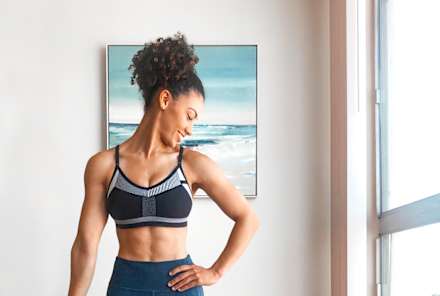Advertisement
What Exactly Is Intuitive Exercise & How Do I Practice It?


Most people get intuitive eating wrong. It's not a license to abandon your health and exclusively eat nutrient-poor foods. Rather, it's just the opposite! It takes your mental health into the equation, helps you stop feeling out of control with your food choices, encourages you look forward to nutrient-dense options, and makes not-so-healthy foods less tempting because they are no longer "off limits."
Food and exercise habits are so innately linked when we think about health. This can be a problem when we let diet culture infiltrate our physical care practice—but, the good news is, we can borrow intuitive eating principles to improve our relationship with movement, too.
What is intuitive exercise?
Intuitive exercise means looking at your workout from the lens of how you want your body to feel rather than how you want it to look.
We all know how important exercise is for our overall health. But if we have a toxic, body-shaming relationship with fitness, it can actually damage our mental health rather than help it. Think of it this way: Aiming to lose weight to heal your body image is like smiling to cure depression. Superficially, it may seem like a solution, but it doesn't get at the root of the issue.
However, when you engage with exercise in a positive light, a consistent fitness practice can improve body confidence and your sense of self-efficacy. Finding a modality you love and paying attention to the impact of daily movement on your mind can do wonders for mood, pain relief, longevity, and especially stress levels.
How to start exercising intuitively:
Find a workout you love to do.
Get clear on what you enjoy, what bores you, and what you absolutely despise doing. Just because some influencer or even a friend says something is the best doesn't mean it's the best for you.
Exercise is, by definition, meant to challenge your body, right? So don't get discouraged when it's not fun like a comedy show all the time. Once you find something that's mentally stimulating for you (even when it's hard), you'll notice it's much easier to enjoy the process and find intrinsic motivation.
Tune in to how your body feels when you're working out.
So many of us have dissociative tendencies when we're stressed, living entirely in our heads. Movement is an amazing way to not only strengthen the body and improve mobility but also ground us and calm our nervous systems.
Instead of mentally checking out during your next tough workout, try keying into the physical sensations you experience. Find a teacher who cues you to visualize the muscle you're working at any given moment in class and educates you on the function of that muscle. Doing so can actually help you activate the muscles more deeply; prevent injury because you're more present and less distracted; improve your body awareness and ability to self-correct (crucial for an at-home workout); and build self-trust with your body.
Note how your body feels post-workout as motivation for the next one.
You're more likely to get yourself out of bed and onto the mat if you know, at the end of your session, you'll be in a great mood, energized, sleeping more soundly, and feeling great about yourself. That's intrinsic motivation.
Similarly, you're more likely to hit snooze if you're only doing it because someone else said you should (external motivation), at the end of class you're still beating yourself up about how you look, or you're so drained that it negatively affects the rest of your day. (That doesn't mean never do tough workouts; see Step 4!)
If your goal is to take care of your body because you know how great it makes you feel and how it changes the way you're able to show up for the people you love, you'll be counting the minutes until the next workout.
Schedule workouts intuitively.
It might seem like having a preplanned schedule is a no-brainer way to build exercise into your day—and it can be, if your favorite workout only happens at a specific time with a specific teacher, and your energy levels match that time slot.
However, if you're so rigid with your time and you work out even if it's not what your body needs in that moment, it can lead to more stress and exhaustion and even make you resent your so-called me time. Remember that you're not a robot—and your needs will change with your body's natural rhythms, particularly for those who menstruate.
Taking time to listen to your body can help you feel more confident jumping into a workout and help you get better at pivoting into rest and recovery when you need that, too.
Talk to your body the way you would to a dear friend.
Pay attention to the narrative in your head before, during, and after your workout. Do you say things like "My body is so gross" or "I've been so bad lately"? Are you repeating limiting beliefs like "I'm not strong enough" or "I'm too weak to do that"? These thoughts are normal and happen to us all, but if we let them have free rein, we'll likely associate exercise with a negative experience.
Rewording or reframing these reflexive thoughts to something more positive can help reverse that. Try: "I know I always feel more confidence and energy after a workout, and I could use that right now," or "This is hard, but I can do hard things" (thanks, Glennon Doyle!). Make the simple fact that you took the time to take care of yourself something to celebrate!











